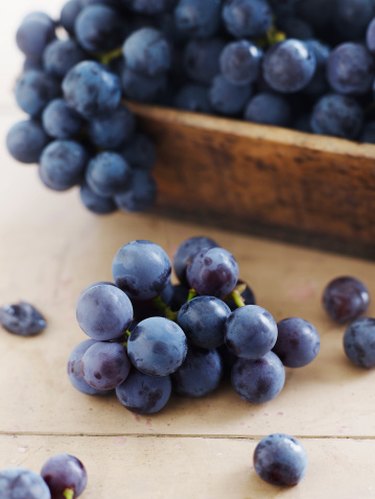
A popular fruit grown in home gardens, grapevines (Vitis vinifera) require a lot of care and cultivation in order to reap a successful crop of grapes. If grapevines on your property are producing lush, green growth in the form of stems and leaves, but few, if any, grapes, you can remedy the situation, but first you must find the problem.
Too Much Nitrogen
Video of the Day
Almost all varieties of fruits, flowers and vegetables produce lush, green growth at the expense of fruit, flowers or vegetables when fed excessive amounts of nitrogen fertilizer. Nitrogen is the primary nutrient responsible for the growth of stems and leaves, and the plants respond in kind. To combat this problem, feed your grapevines with a fertilizer labeled with a first number of zero, such as 0-15-15. This fertilizer has no nitrogen but contains 15 percent by volume of both phosphorus and potassium.
Video of the Day
Late Spring Flrost
A hard frost late in spring can often kill the flowers or flower buds on grapevines and other fruiting and flowering plants. The vines themselves will survive the frost, but the flowers will never form, so neither will the fruit. The good news is that flowering and fruiting will resume the next year, barring unseasonably late frosts.
Too Much Shade
Grapevines growing in too shady of a location will fail to set fruit, even though their vegetative growth appears robust and healthy. Unfortunately, the only remedy in this situation is to remove the tree or building casting the shade, transplant the grapevines or live with the fruitless vines.
Improper Pruning
Entire books have been written about the proper pruning procedure for grapevines. Too vigorous a pruning removes most of the buds that will eventually grow to produce grapes, resulting in a poor crop. Too little pruning leaves too much of the vine competing for energy and nourishment needed to produce fruit, also resulting in a poor crop.